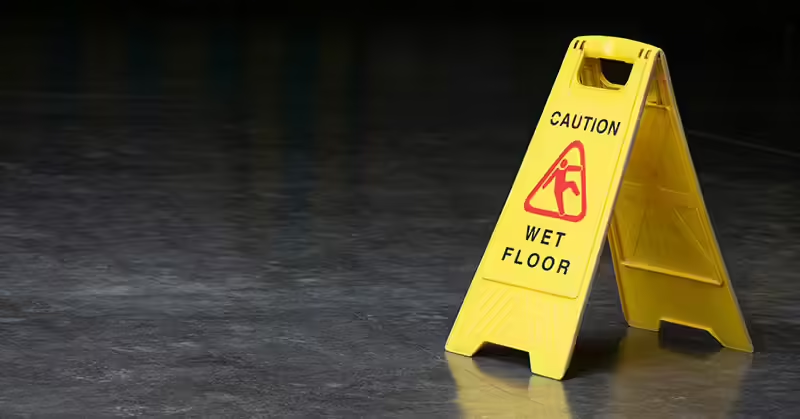Premises Liability and the Open and Obvious Doctrine
February 22, 2021

Background: Texas Premises Liability
“Premises liability” is the official term used to refer to injuries you might sustain due to a condition on someone’s property under Texas law. For example, a typical, everyday premises liability case might happen when someone slips and falls in a puddle of water at the grocery store. However, premises liability also refers to more serious cases, such as the ones our firm handles at industrial worksites around the United States. Conditions at such worksites might include, for example, a faulty valve that leads to an explosion, a poorly maintained walkway that gives way and causes a worker to fall many feet below, or a permanently affixed manlift that suddenly falls, causing the worker to fall with it.
Premises liability is a branch of negligence law with different elements that define a property owner’s duty with respect to those who enter the property. W. Invs., Inc. v. Urena, 162 S.W.3d 547, 550 (Tex. 2005). Under premises-liability principles, a property owner generally owes those invited onto the property a duty to make the premises safe or to warn of dangerous conditions as reasonably prudent under the circumstances. Austin v. Kroger Texas, LP, 465 S.W.3d 193, 202 (Tex. 2015); Corbin v. Safeway Stores, Inc., 648 S.W.2d 292, 295 (Tex. 1983); Smith v. Henger, 226 S.W.2d 425, 431 (Tex. 1950).
The owner of premises may be subjected to liability in two situations: (1) those arising from a premises defect; and (2) those arising from an activity or instrumentality on the premises. Koch Refining Co. v. Chapa, 11 S.W.3d 153 (Tex. 1999). A person injured on another’s property has two potential causes of action against the owner of the property: (1) a negligence claim for negligent activity on the premises, and (2) a premises liability claim for an unreasonably dangerous condition on the premises. E.I. DuPont de Nemours & Co. v. Roye, 447 S.W.3d 48 (Tex. App. Houston [14th Dist.] 2014). These distinct theories of recovery require different elements of proof. Taylor v. Louis, 349 S.W.3d 728 (Tex. App.–Houston [14th Dist.] 2011, writ denied).
What Duties Does the Landowner Owe?
Under Texas law, the duties owed by a landowner are determined by your status on the property. The highest duties are owed to those persons known as “invitees”, defined under Texas law to mean a person who enters the premises with the owner/controllers express or implied knowledge, for the mutual benefit of both parties. You might also be a “licensee” or even a trespasser. In most workplace cases, you are considered to be an “invitee”. However, other special laws might apply depending on your relationship with the landowner. For example, if you are a contractor who is injured on a worksite, you may have to make a showing that the landowner controlled certain aspects of your work to be able to recover. The law in this area is complex, and it is to your benefit to hire lawyers who know the ins and outs of how to prove a case against different types of landowners on behalf of different types of injured persons.
“Open and Obvious”
Another aspect of Texas law that injured persons should be aware of is the doctrine of “open and obvious”. Under this doctrine, a landowner who is defending its case against your claims will allege that you should have been able to avoid the condition that caused your injuries because the condition was “open and obvious” to an everyday person. Some ways to combat this defense are: 1) while some of the condition might have been “open and obvious,” the actual mechanism that caused your injuries was not; 2) it was necessary for you to use that part of the premises to do your job or to go where you needed to go, and therefore the defense should not apply; or 3) the condition was not “open and obvious” at the time of your injuries.
For example, in a recent case the driver of a cement truck filed a lawsuit against the owner of a cement plant, alleging he was injured while loading his truck. Rodriguez v. Cemex, Inc., 579 S.W.3d 152, 156 (Tex. App.—El Paso 2019). Specifically, the driver of the truck claimed that another driver at the plant had failed to secure a platform at the plant, which caused the plaintiff’s leg to become wedged between the platform and the top of his trailer, crushing his ankle.
The company defending the suit claimed that the driver knew how the platform worked, had been to the cement plant many times, and was aware of the dangers associated with the platform. Therefore, they argued, the plaintiff should not be able to recover because the dangers were “open and obvious” to him.
The Court disagreed. The Court explained that although a driver in the plaintiff’s position may have appreciated the general dangers associated with the platform, he did not know that the platform could become unstable in the particular way which led to his injuries. In that case, it turned out that the exact same thing had happened to other drivers before, and the plaintiff had no idea about those other injuries. Nor were there any warnings telling the plaintiff that such an injury could happen to him.
In another significant case for the Open and Obvious doctrine in Texas, Austin v. Kroger Texas, LP, 465 S.W.3d 193, 201 (Tex. 2015), an employee fell while mopping a restroom floor. An oily liquid had leaked onto the floor, and the employee was the “floor clean up person.” The employee recognized the danger that the slippery liquid presented and placed “wet floor” signs around the area. He did not follow Kroger’s safety handbook as it pertained to cleaning up spills on the floor, and while he was cleaning the spill, he slipped and fell. Kroger argued that because the risk of slipping and falling on a wet floor is commonly known, and the employee admitted that he was aware of the wet floor and appreciated the risk, it had no duty to protect or warn the employee against that risk.
The Austin court opined that “when the condition is open and obvious or known to the invitee, the landowner is not in a better position to discover it. When invitees are aware of dangerous premises conditions, whether because the danger is obvious or because the landowner provided an adequate warning, the condition will, in most cases, no longer pose an unreasonable risk because the law presumes that invitees will take reasonable measures to protect themselves against known risks.”
In Austin v. Kroger Texas, LP, the Court clarified that an invitee’s awareness of a dangerous premises condition does not bear on the issue of contributory negligence but instead relieves the landowner of a legal duty to warn the invitee of the condition. This holding effectively reinstates the “no duty” doctrine in Texas, which had previously been abolished.
In order to satisfy the open and obvious requirement, the dangerous condition must be open and obvious at the time of the injury, not when looking back at the condition at some time following the injury. For example, if a person dove into a murky lake that happened to only be a few feet deep, and at the time, the person was unaware that the lake was only a few feet deep (and the person was injured after diving into the lake), it cannot be argued that the dangerous condition, a shallow lake, was open and obvious.
Is This the Only Claim I Can Bring?
Just because you are injured by a condition on a property does not mean that premises liability is the only claim you can bring against the defendant. We have handled a number of cases where the facts show that both the pre-existing condition and a so called “contemporaneous act” by the defendant contributed to cause the client’s injuries. In cases such as these, you may be able to bring several claims against the defendant to make sure you receive the maximum compensation possible.
Who Decides Who Is Liable in a Texas Premises Liability Lawsuit?
Duty is the only portion of the negligence case left exclusively in the hands of the trial judge. Nabors Drilling, USA, Inc. v. Escoto, 288 S.W.3d 401, 404 (Tex. 2009) (emphasis added). It is not a finding of fact made by the jury. Typically, where a defendant challenges the existence of a duty of care, he or she asks the trial court to exercise its role and declare as a matter of law that no duty exists either by way of a proper motion for summary judgment or upon the completion of the plaintiff’s proof at trial. While the question is one of law, it is informed by the facts, and the court should consider the facts in the light most favorable to the plaintiff and then should determine whether the matter should proceed or be dismissed based upon the law. Fort Bend County Drainage Dist. v. Sbrusch, 818 S.W.2d 392, 395 (Tex. 1991).
How Much is a Texas Premises Liability Case Worth?
It is hard to predict with exact certainty how much a given premises liability case is worth. Juries may often look at the severity of your injuries to determine how much they would award in compensation. Additionally, premises liability cases often come down to what the landowner knew or should have known about the condition before it caused your injuries. If a jury finds that the company callously disregarded a known risk that was likely to cause injury to you or others, they may be more likely to award a substantial sum in order to send a message that such conduct is not acceptable.
What Deadlines Apply to a Texas Premises Liability Case?
There are two time related deadlines that an injured person should be aware of with respect to premises liability cases. First, because these cases are based on the condition of a premises, the company or companies responsible for those conditions may try to fix the conditions shortly after your injury in an effort to hide their negligence. If you do not act quickly, evidence of the condition may be forever lost. That is why it is important to hire an attorney such as the attorneys at Morrow & Sheppard, so they can act immediately on your behalf and preserve all evidence of the accident.
Second, it is important to note that in Texas, a premises liability case must be brought within two years. While this time period can sometimes be extended in certain conditions, you will want to file the lawsuit as soon as an investigation is completed to make sure you are holding those accountable on a timely basis.
How Much Does It Cost to Hire a Texas Premises Liability Lawyer?
A good premises liability lawyer should not cost you anything unless they recover on your behalf. That is exactly how we operate at Morrow & Sheppard- we don’t get paid unless you win.
If you or a loved one were seriously injured as a result of a premises defect, contact our work injury lawyer for a free, confidential consultation. We can help.
Daniel Sheppard is licensed to practice personal injury law in Texas and Louisiana. Daniel takes pride in providing exceptional service to clients who were seriously hurt on the job and brings his relentless work ethic into the office and the courtroom. Learn more about Daniel.
- Home
- |
- Workplace Accidents
- |
- Premises Liability and the Open...
















































